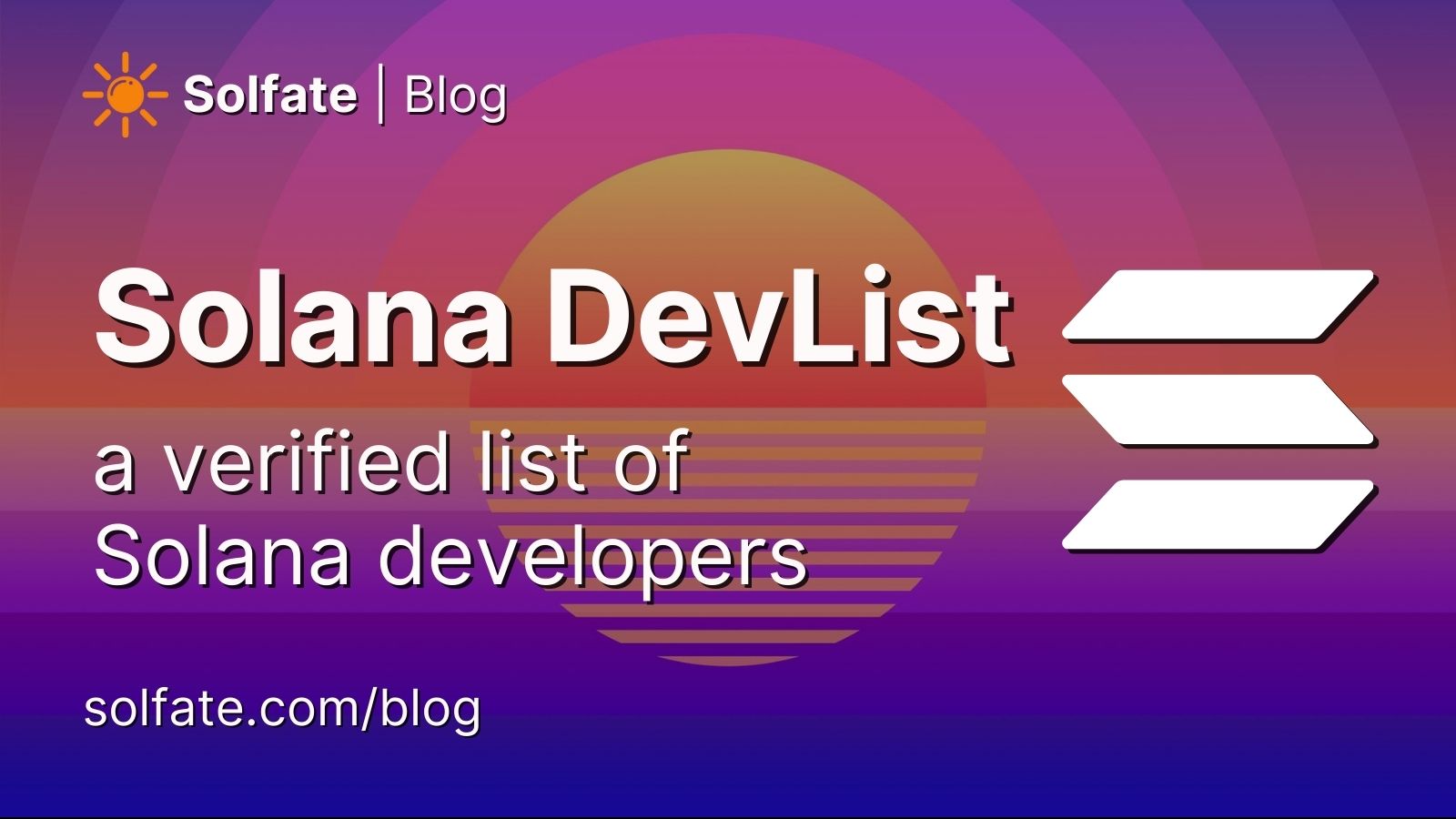Introducing the Solana DevList, a publicly accessible list of Solana wallet addresses verified to be owned by Solana developers. Each member of the DevList was approved to join, claiming a non-transferrable membership token, because they were verified having code contributions to the Solana ecosystem.
The DevList is a free and public good for the Solana ecosystem. We at Solfate charge no fee to claim the DevList membership token. Members will only pay for the usual Solana transaction and rent storage cost to claim the token. No more.
What is the goal of the DevList?
The goal is simple: create a publicly accessible list of Solana wallets that are verified to be owned by real Solana developers.
You could think of it like a "high quality marketing list of Solana developers" where anyone can access this list to provide value and interact with the members. Token gated experiences, airdrops, discounts, etc. No restrictions.
How to join the DevList
In order to apply to join the Solana DevList, we will ask for a few pieces of information:
- any Solana wallet,
- your GitHub account, and
- your X/Twitter account
Your Solana wallet will be used to sign in to the Solfate website. By connecting a wallet, you will be asked to sign a plaintext message (following the "Sign In With Solana" spec when supported by your wallet) that will enable us to verify you do in fact control this wallet.
You are also required to connect a GitHub account, using our GitHub OAuth application. By connecting a GitHub account using GitHub's OAuth API, we are able to verify a person actually owns the connected GitHub username. This OAuth connection uses the standard GitHub API and only grants Solfate read-only access to your GitHub profile information (just like any other "Sign in with GitHub" flow). We do not get access to private repos.
Next, you will be asked to connect your Twitter / X account, using our Twitter OAuth application. Just like GitHub, this only grants Solfate read-only access to your profile information using the Twitter API (just like any other "Sign in with Twitter" flow).
Why connect to GitHub and Twitter?
There are two primary reasons we require all DevList membership applications to connect both a GitHub and Twitter/X account:
- checking code contributions, and
- sybil resistance
With a connected GitHub account, we are able to confirm a person does in fact own a specific GitHub username. We then use the public GitHub API to see public code contributions in the Solana ecosystem. Like your commits to open source repos.
However, many people write a lot of code in private repos. And since we have no way of seeing these private repos and a specific GitHub account's contributions to them, we also use the connected Twitter accounts to check a person's social presence to help see if they are a real person and not trying to bot the system.
Sybil resistance
Sybil resistance is hard and is largely an unsolved problem. Many very smart teams are doing their best to combat sybil attacks. Often times, the most commonly used solution comes down to lots of data analysis.
One of the primary ways that Solfate and the DevList attempt to combat sybil attacks is by requiring a person to connect both a GitHub and Twitter account. While this is a friction point for applicants, it allows us to perform various checks against these external platform accounts to be relatively sure that a specific DevList application was submitted by a real person.
We rely on a simple consensus idea: if your GitHub account has gotten PRs approved and merged into popular, well respected repos (managed by different organizations with different merge criteria), the GitHub account is very likely to be owned by a real person.
How does DevList approval work
Once you apply to join the DevList, we will attempt to verify your GitHub account has meaningfully contributed code to the Solana ecosystem.
First by attempting to automatically approve your membership based on your GitHub account's public activity, then by a combination of manual review of your public GitHub repositories and vouchers from other Solana developers in the ecosystem.
For automated approvals, we run an automation script that will check a preset list of public and commonly contributed repos. Using the public GitHub API, our script will check how much activity your specific GitHub account has on these repos. If our automation script can determine you have made many contributions to these commonly used repos, it will auto approve your DevList application.
This automated script checks many well known and widely used public GitHub repos. It is by no means an exhaustive list, but rather a starting point to attempt to auto approve DevList applicants.
Note: If you would like to submit a well maintained public GitHub repo to our automation script, please open a PR and do so. All will be carefully considered!
If our automation script is not able to auto approve your DevList application, you will be added to our manual review queue. In this manual review, we will manually check your GitHub account's public repos and code contributions and consult vouchers from other developers and builders in the Solana ecosystem.
We will continue to work our way though this queue as diligently as we can. Often in batches.
How to claim the DevList NFT
Once your DevList application has been approved, you will be able to claim the DevList membership token and officially become a member of the Solana DevList!
This membership token is a non-transferrable NFT (some call them soul-bound tokens) that uses the new Solana Token Extension program. Once you mint your DevList membership token, you will NOT be able to transfer it but you can always burn the membership token.
You can claim the DevList token to any Solana wallet you would like, including a Ledger hardware wallet. But remember: it is non-transferrable.
On the DevList claim page, you will be asked to sign a plaintext message then a Solana transaction. Both are required. If you are using a Ledger, be sure to toggle on the "Using a Ledger" setting and have "blind signing" enabled on your Ledger.
Note: At the time of this being written, Ledger hardware wallets do not support some common Solana instructions (like setting priority fees) and do not support signing plaintext messages. As a workaround, many platforms/services (including the Solfate and the DevList) will ask Ledger devices to sign a simple transaction with a single SPL memo instruction. At this time, this is the closest we can all get to allowing Ledger hardware wallets to sign plaintext messages.
Apply to join the DevList today!
You can apply to join the DevList today: solfate.com/devlist


